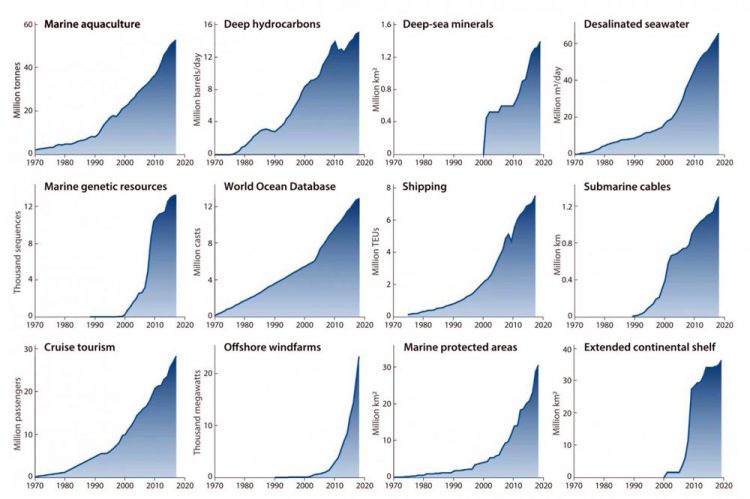The Blue Acceleration: Recent colossal rise in human pressure on ocean quantified

Global trends in use of the marine environment. Usage reached an inflection point around the turn of the new millennium. Credit: One Earth
Human pressure on the world's ocean accelerated sharply at the start of the 21st century and shows no sign of slowing, according to a comprehensive new analysis on the state of the ocean.
Scientists have dubbed the dramatic rise the “Blue Acceleration”. The researchers from the Stockholm Resilience Centre, Stockholm University, synthesized 50-years of data from shipping, drilling, deep-sea mining, aquaculture, bioprospecting and much more. The results are published in the journal One Earth, 24 January.
The scientists say the largest ocean industry is the oil and gas sector, responsible for about one third of the value of the ocean economy. Sand and gravel are the ocean's most mined minerals to meet demand from the construction industry.
As freshwater become an increasingly scarce commodity, around 16,000 desalination plants have sprung up around the world in the last 50 years with a steep rise since 2000, according to the analysis.
Lead author Jean-Baptiste Jouffray from the Stockholm Resilience Centre said, “Claiming ocean resources and space is not new to humanity, but the extent, intensity, and diversity of today's aspirations are unprecedented”
The industrialization of the ocean took off at the end of the last century, driven by a combination of technological progress and declining land-based resources.
“This Blue Acceleration is really a race for ocean resources and space, posing risks and opportunities for global sustainability”
The study highlights some positive human impacts. For example, the area protected from some exploitation has increased exponentially with a surge since 2000 that shows no signs of slowing. And offshore wind farm technology has reached commercial viability in this period allowing the world to reduce reliance on fossil fuels.
The authors conclude by calling for increased attention to who is driving the Blue Acceleration, what is financing it and who is benefiting from it? The United Nations is embarking on a “decade of the ocean” in 2021. The scientists say this is is an opportunity to assess the social-ecological impacts and manage ocean resources for long-term sustainability.
They highlight there is a high degree of consolidation relating the seafood industry, oil and gas exploitation and bioprospecting with just a small handful of multinational companies dominating each sector. The team suggests that banks and other investors could adopt more stringent sustainability criteria for ocean investments.
Media Contact
More Information:
http://dx.doi.org/10.1016/j.oneear.2019.12.016All latest news from the category: Earth Sciences
Earth Sciences (also referred to as Geosciences), which deals with basic issues surrounding our planet, plays a vital role in the area of energy and raw materials supply.
Earth Sciences comprises subjects such as geology, geography, geological informatics, paleontology, mineralogy, petrography, crystallography, geophysics, geodesy, glaciology, cartography, photogrammetry, meteorology and seismology, early-warning systems, earthquake research and polar research.
Newest articles

Scientists transform blood into regenerative materials
… paving the way for personalized, blood-based, 3D-printed implants. Scientists have created a new ‘biocooperative’ material based on blood, which has shown to successfully repair bones, paving the way for…

A new experimental infection model in flies
…offers a fast and cost-effective way to test drugs. Researchers at the Germans Trias i Pujol Research Institute and Hospital have reinforced their leading role in infectious disease research by…

Material developed with novel stretching properties
KIT researchers produce metamaterial with different extension and compression properties than conventional materials. With this material, the working group headed by Professor Martin Wegener at KIT’s Institute of Applied Physics…



